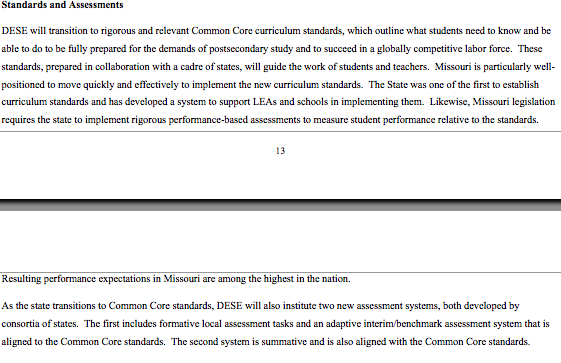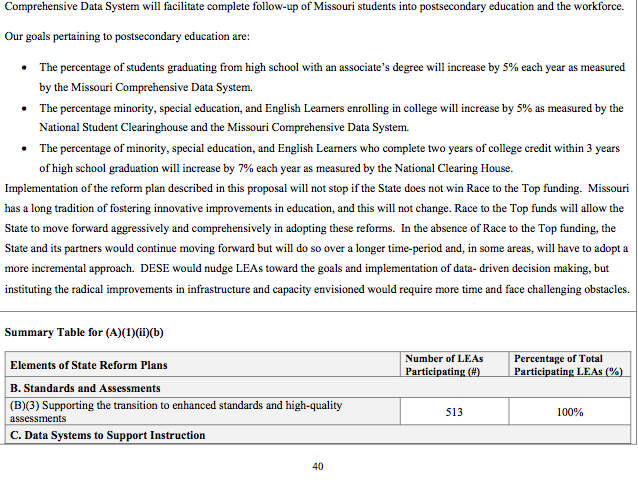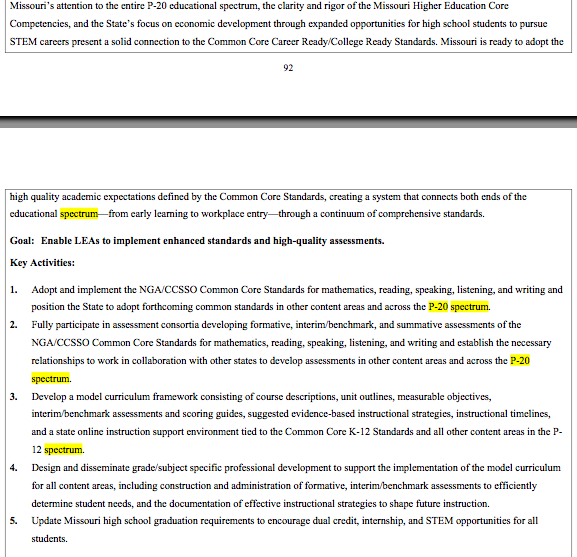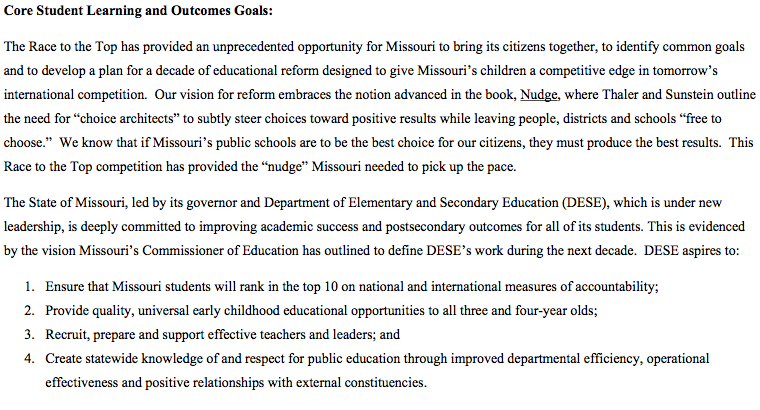Representative Scott Dieckhaus responded to a previous post on this blog with some accusations as to the validity of the information presented here regarding Race To The Top and Educated Citizenry 2020.
To tie Educated Citizenry 2020, Race to the Top, and the Common Core Standards together as one movement is erroneous. To assume that they are being hatched from the same group of people is laughable. To jump to the conclusion on a previous post that just because someone (myself) listens to Arne Duncan speak somehow indicates that the person supports everything that Arne Duncan does is irresponsible. I do hope that facts and responsibility find their way onto this blog soon – otherwise I am sure that the main stream, left-wing media could use a few more reporters similar to these.
–Scott Dieckhaus
Homeschooling United stands by the information we provide to you and appreciates your attention to monitoring legislation and legislators to ensure educational freedoms and parental rights.
As there is some disagreement between Representative Dieckhaus and Homeschooling United, as it relates to the erroneous tying together of RTTT/Common Core Standards/Educated Citizenry 2020, I would like to present some facts that will put this issue to rest. I would also mention that it is very important for all citizens to understand how this is not just an issue related to the public education sector. Educated Citizenry 2020/RT3 (Race To The Top)/Common Core Standards will affect all forms of education, and that does include the homeschooling community.
In January of 2010 Missouri applied for RT3 Initial Funding. The application was removed from the internet, but I can provide you with screen shots from the PDF file that was saved before it was removed. The applications show, very clearly, that Missouri was seriously pursuing RT3, its funding, and all of the requirements and mandates that went with it. In my opinion, Missourians have been calling for real educational reform for quite some time, before RT3 came on to the scene, but why does the legislature and DESE feel we need to be “nudged” (or led by the nose) to adopt a plan that may create more problems than it solves? And is there a plan to include parents in the decision-making process? RT3 and Educated Citizenry 2020, at this point, provide less local control and parental input than previously held philosophies that were previously the cornerstones of educational success.
Our vision for reform embraces the notion advanced in the book, Nudge, where Thaler and Sunstein outline the need for “choice architects” to subtly steer choices toward positive results while leaving people, districts and schools “free to choose.” We know that if Missouri’s public schools are to be the best choice for our citizens, they must produce the best results. This Race to the Top competition has provided the “nudge” Missouri needed to pick up the pace.

The foundations for RT3 and Educated Citizenry 2020 are Common Core Standards and Charter Schools.

RT3 states that common curriculums will be developed and across the states, by a consortium of states. DESE has made it clear, and promised in their RT3 application they would proceed with the adoption of these standards and has already done so, regardless of receiving approved federal RT3 funding or approval/funding from the Missouri legislature. Also see page 5 of Educated Citizenry 2020 which states that Missouri has already adopted Common Core Standards.

Implementation of the reform plan described in this proposal will not stop if the State does not win Race to the Top funding.
Terminology such as P20 Pipeline and P20 System are referring to coordinating common core curriculums through Pre-K through college.
RT3:
Participating agencies will agree upon a core of data elements to contribute to the common P-20 system. These will comprise a significant resource for decision making. Analyses of the factors that contribute to success from pre-school through postsecondary education and into the workforce will be included. Common definitions and standards will not only support the comparability of the data within the P-20 system, but also the quality and integrity of the data within the individual data systems of the participating agencies.
Across the P-20 community, a major challenge has been to provide access to the longitudinal data being consolidated for decision making. Individual agencies have websites and unique reporting tools, but users need a single site to access the information that the P- 20 Council and the individual agencies have provided. The Show-Me Portal will fill this role. It will be designed and built to enable all users to access relevant and permitted data.

EC2020:
Individual members offered ideas affecting early childhood through higher education, including the need to strengthen the P-20 pipeline and cooperation among stakeholders.
EC2020 promotes Charter Schools by recommending on page 6:
Provide access to high-quality charter schools to all Missouri students. Allow any public school district to sponsor a charter school within the district.
RT3:
Demonstrating and sustaining education reform, by promoting collaborations between business leaders, educators, and other stakeholders to raise student achievement and close achievement gaps, and by expanding support for high-performing public charter schools, reinvigorating math and science education, and promoting other conditions favorable to innovation and reform.
The Missouri legislature has yet to pen a bill fully addressing this, but I fully expect it to be buried in an omnibus bill at the end of the session where it will be harder to follow and garner much less attention. SB 14 was introduced, by Senator Pearce, to address open enrollment issues, however.
Addressing merit pay and teacher tenure are common threads through RT3 and Educated Citizenry 2020. On page 6 of EC2020 it states:
Develop a statewide system for evaluating teacher effectiveness to be used in performance-based compensation. Charge the Joint Committee on Education with leading a taskforce to discuss, review, and develop a statewide system for identifying and rewarding effective teaching. The taskforce will review models used in cities and states throughout the country and frame their work around current research and best practices. Considerations shall include revision of tenure laws that will empower school districts to support the retention of effective teachers and the removal of ineffective teachers. The taskforce may use the Teachers Choice Compensation Plan for St. Louis Public Schools (§168.745-168.750, RSMo.) as a foundation for their discussions. The taskforce will present a comprehensive, cohesive model with specific proposals for legislative action to the General Assembly no later than December 31, 2011.
RT3 states:
Attracting and keeping great teachers and leaders in America’s classrooms, by expanding effective support to teachers and principals; reforming and improving teacher preparation; revising teacher evaluation, compensation, and retention policies to encourage and reward effectiveness; and working to ensure that our most talented teachers are placed in the schools and subjects where they are needed the most.
The legislature must have thought this issue was worth pursuing because SB13 has been introduced to address this very issue. Senate Education Chairman David Pearce filed this bill and it has advance through its second reading as of this posting.
Technology is the answer in underperforming schools in both RT3 and EC2020.
RT3:
Supporting data systems that inform decisions and improve instruction, by fully implementing a statewide longitudinal data system, assessing and using data to drive instruction, and making data more accessible to key stakeholders.
Using innovation and effective approaches to turn-around struggling schools, by asking states to prioritize and transform persistently low-performing schools.
EC2020, on page i of the executive summary:
Technology in the delivery of education at all levels.
School Readiness, also in both documents.
EC2020: P. 6 and 7
Provide parents and early childhood educators with the information they need to see that all children enter kindergarten on par with their peers and ready to learn. Formalize DESE’s existing school readiness standards by requiring that standards be distributed to parents, early childhood educators, and school districts. School readiness assessment data and information on prekindergarten experiences for all kindergartners shall be included in core data reporting requirements.
Advance efforts to support voluntary, universal prekindergarten. Explore potential funding sources for prekindergarten education including federal funding. The Committee would like to note that there was not unanimous support for the prekindergarten recommendations.
RT3:
2. Provide quality, universal early childhood educational opportunities to all three and four-year olds;

SB 20 and SB 21 were introduced in Missouri’s legislature, at the beginning of the session, by Robin Wright-Jones. Each bill addresses early childhood education and mandates lowering of the compulsory school age and kindergarten enrollment.
Be it noted that not all the proposed education reform is bad, but there are many concerns that we all should be looking at as Missourians and parents. We need to make sure the solution aren’t worse than the problems.
This week has seen some highly reactive responses from Jefferson City as it relates to information circulating on blogs and testimony given at committee hearings concerning education reform proposed by the 96th general assembly. If the leadership isn’t confident in the vehicle they are driving, to bring quality education to the children of Missouri, perhaps they should rethink the proposed plans or just not put their signatures on the documents.
So, if Representative Dieckhaus would still like to dispute any erroneous to ties to the afore-mentioned items, we will be happy to provide more comparisons. As for any future career with the “main-stream, left-wing media”, I think I’ll pass, but if Brietbart or FOX is reading this post, I am happy to consider any offers.




